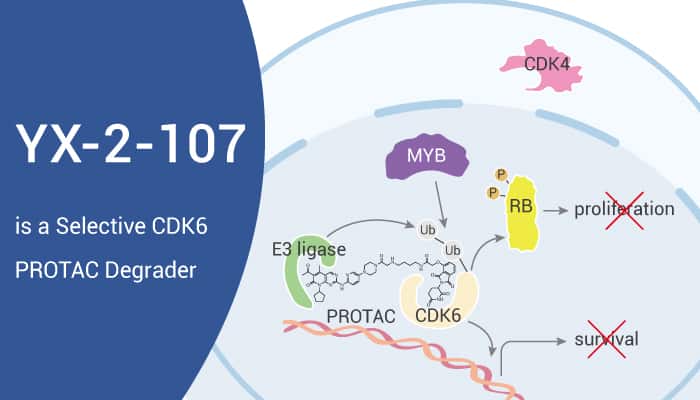Ph+ ALL (Philadelphia chromosome-positive acute lymphoblastic leukemia) is a rare subtype of leukemia characterized by the abnormal formation of the Philadelphia chromosome, which occurs when pieces of chromosomes 9 and 22 switch with each other. The incidence of Ph+ ALL increases with age, and occurs in up to 50 % of ALL diagnosed in individuals’ ≥50 years old. Research shows that Ph+ ALL cells are dependent on CDK6 expression. In addition to regulating the G1-S transition, CDK6 exhibits growth-promoting functions in hematologic malignancies. In T-cell ALL, CDK6 exerts kinase-dependent prosurvival effects by redirecting the glycolytic pathways to the increased production of the antioxidants reduced NADPH and glutathione and decreased levels of reactive oxygen species. Here, we will introduce a selective CDK6 degrader——YX-2-107.
YX-2-107 is a PROTAC (IC50= 4.4 nM) that selectively degrades CDK6.

In vitro experiments, YX-2-107 (0, 1.6, 8, 40, 200, 1000 nM;4 h) selectively degrades CDK6 in BV173 cells. Also, YX-2-107 (2000 nM; 48 h) shows inhibition of S phase in Ph+ BV173 and SUP-B15 cells. In addition, YX-2-107 (2000 nM; 72 h) inhibits RB phosphorylation and FOXM1 expression in Ph+ BV173 and SUP-B15 cells.
In vivo experiments, YX-2-107 (150 mg/kg; i.p.; single daily for 3 days) is pharmacologically active in suppressing Ph+ ALL proliferation in mice. Moreover, YX-2-107 (10 mg/kg; i.p.; single) shows a maximum concentration of 741 nM (150-fold greater than CDK6 degradation IC50), with clearance from the plasma after 4 hours.
All in all, YX-2-107 can inhibit the development of Ph+ ALL in rats.YX-2-107 has good research prospects in Ph+ ALL.
Reference:
- De Dominici M, et al. Blood. 2020 Apr 30;135(18):1560-1573.
- Liu-Dumlao T, et al. Curr Oncol Rep. 2012 Oct;14(5):387-94.